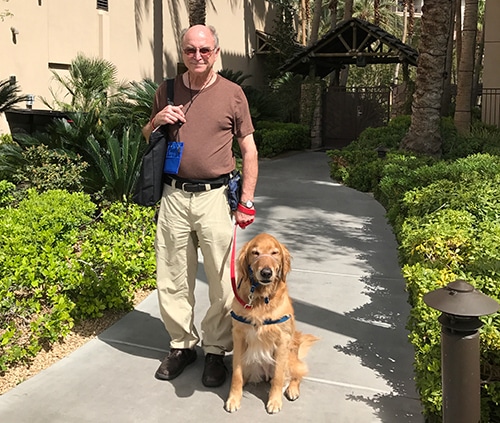How Therapy Pets Can Help Stroke Survivors with Aphasia
5 min read
Animals have been used for improving the functional and emotional state of humans for thousands of years. Pets, including dogs, cats, horses, rabbits, birds, and even reptiles, can be used as emotional support animals or therapy animals. Their main job is to offer emotional support to individuals experiencing various physical or mental disabilities who require physical, psychological, occupational, recreational, or speech-language therapy.

After a stroke or other acquired brain injury, a person may have aphasia. Aphasia is a communication disorder that causes difficulty formulating and/or comprehending spoken or written language because of damage to language center in the brain. A person with aphasia is likely to have some trouble communicating functionally, which can cause problems in relationships and everyday life.
How Can Animals Help With Aphasia?
Psychological support is essential for patients with aphasia. A majority of people who have aphasia experience depression, which makes emotional support all the more important. Sometimes, this type of support fails to come from humans and can only be offered by a pet – a living being that also lacks verbal communication skills. These animals, especially dogs and cats, need no words to provide their handlers with unconditional love and mental support. They neither judge a person for their inability to speak, nor make them feel sorry about it.
There are 3 types of support animals: service dogs, therapy dogs, and emotional support animals (ESA). The training of these animals varies, as does who they help and where they are allowed to go or live. While ESAs are not trained in the same way as service dogs, they are more than pets and must be prescribed.
When it comes to therapy pets, dogs especially have a natural ability to understand some parts of human communication. It doesn’t matter if the training is in the form of verbal commands, hand signals, or a combination of both. People with aphasia may not be able to communicate clearly with other human beings, but they will likely find solace and empathy when talking to a dog using whatever words they are able to put together.
Evidence for Therapy Pets for Aphasia
In terms of actually improving the quality of life of women and men with aphasia, there is little published research to back the role of house pets and working dogs, but there is sufficient anecdotal evidence available to show value:
- The Aphasia Centre of Ottawa-Carleton supported a spring Walk-and-Talk-a-Thon in 2004. In the event, a man dealing with non-fluent aphasia, leading to poor communication, showed a huge improvement. He was able to use short spoken commands and hand gestures to get his message across. [1]
- An experimental study carried out by Lafrance, Garcia, & Labreche (2007) focused on the effects of a therapy dog in improving the communicative abilities of a 61-year-old man with non-fluent aphasia. Thirty days after the stroke, the participant received extensive speech-language therapy, as well as animal-assisted therapy (AAT) in combination with the speech-language therapy. The results concluded that the non-verbal and verbal behaviors of the man were most evident in the presence of the dog. Moreover, more people approached the participant for natural conversation when the dog was around. 2
- A case study from a speech-language pathologist’s perspective explored the effects of two therapy dogs on the communicative abilities of a woman aged 72 who suffered two strokes. The research indicated that therapy with the animals had a positive impact. More people were also drawn to her and tried communicating about her furry friend when she would walk one of the dogs at the completion of each therapy session. [1]
Although there is still more evidence needed to prove whether pets (especially dogs) are helpful in alleviating the symptoms of aphasia or not, there is no denying the emotional support they offer to their handlers.
Read how stroke survivors are getting physical, cognitive, and emotional assistance from pet therapy. Learn more about how pets can help the elderly age in place more effectively too from the National Council for Aging Care.
Dogs Helping People with Aphasia
Ronnie Cribbs has aphasia, but his service dog Zeus doesn’t care. The gentle Golden Retriever stays by Ronnie’s side, detecting his diabetes and seizures, and even helping him carry packages. Because Zeus is a trained service animal, all the standard expenses of owning a dog (e.g. grooming, food, vet bills) are tax-deductible for the family.

While people are warned against petting Zeus while he’s working, he is still a wonderful conversation piece that gets Ronnie talking. First thing in the morning, Ronnie has to walk and feed Zeus, giving him purpose and helping him to get physical exercise. He issues commands, sometimes with words, and sometimes with body language, but there is clearly communication between these two.
Other stroke survivors have reported similar benefits from owning pets. Regina Tipton credits her dog, Elvis, with helping her get out of bed when she was suffering from depression after a stroke. She had to remember the names of his toys and give him commands. When she took him on walks, her neighbors wanted to know her puppy’s name and how old he was, giving her lots of practice talking to new people.

Regina felt useful owning a dog, though admittedly it wasn’t easy starting with a rescue puppy. Her pet gave her a purpose again, something she felt was lost when the stroke took away her ability to work. Regina describes it best herself when she says, “I may have rescued Elvis, but he saved me.”
Thank you to Brad Smith from TherapyPet.org for contributing the majority of this piece. It came at a time when we were hearing from Ronnie and Regina about how important their dogs were in their recoveries, so we felt it was important to share with the aphasia community.
An abridged version of this article appears in the Advanced Reading Therapy app to help stroke survivors improve their reading skills.